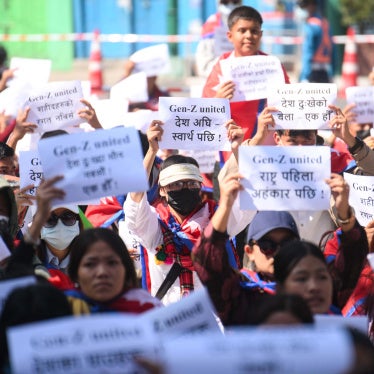Malaysia´s first new prime minister in more than 20 years, Abdullah Ahmad Badawi, faces scores of challenges after succeeding Mahathir Mohammed on Friday. But none will be greater than those necessary to transform Malaysia from an authoritarian regime into a nation that respects human rights and operates under the rule of law. A critical first step would be to protect those members of society whose rights have consistently been under attack: migrant workers and those who defend their rights.
Two million foreign migrant workers – predominantly from Indonesia, Bangladesh and the Philippines– reside in Malaysia. Less than half work there legally. Increasingly, they are women who find employment within private homes, in factories or on plantations.
Malaysia´s export-oriented economic strategy has relied heavily on the labour of foreign workers, who comprise about 10 per cent of the total workforce. Government estimates suggest that illegal migrant workers comprise up to 70 per cent of the labour force in manufacturing and construction, sectors that have driven Malaysia´s economic growth.
After 22 years in power marked by a remarkable rise in standards of living, the Mahathir government has left a legacy of excessively punitive policies and practices that often deny basic rights to migrant workers – especially those without full legal status – and stifle the work of human-rights groups investigating alleged abuses.
A stark example is the October 16 conviction of Irene Fernandez, a leading advocate for the rights of women and migrant workers, for publicising human-rights abuses in Malaysia. In 1995, Tenaganita (Women´s Force), a nongovernmental organisation led by Fernandez, issued a report documenting beatings, sexual violence and inadequate food and water in immigration detention camps. Instead of prosecuting the prison guards allegedly responsible for these abuses, however, the government targeted Fernandez under the restrictive press laws for “maliciously publishing false news”.
Fernandez´ seven-year trial, the longest in the country´s history, became a symbol of the government´s hostile stance towards human-rights defenders. It drained the resources of one of the country´s few organisations addressing the needs of migrants, whose legal status and poverty renders them particularly vulnerable to abuse.
Fernandez is an internationally recognised human rights advocate, who has worked to reform laws on rape and domestic violence, provide support services to women trafficked into forced labour and sex work, and create programmes to improve health and awareness for HIV-positive women.
What reward did Dr Mahathir´s government confer upon this activist who has worked tirelessly for social justice? Twelve months in prison. Years of being called to court. Increased monitoring and harassment. And a clear warning to others who dare to speak up about state violations of migrants´ rights.
In the face of this repression, local human rights groups and women´s organisations have courageously expressed defiance. As Fernandez observed after her conviction: “Other Malaysian NGOs are becoming vocal about the incidence of state violations of human rights. There is more solidarity between organisations because of this development.”
Another worrying development was the amendment last year of Malaysia´s immigration law and tough enforcement measures to provide for caning, fines, imprisonment and mass deportation of undocumented migrant workers. Local nongovernmental organisations report that migrant workers suffer poor conditions in detention facilities, violations of due process and lack of access to health care. The country´s punitive immigration law deters migrant workers from reporting or escaping abusive employment situations, but it fosters impunity for exploitative employers. Women domestic workers, because of their isolation in private homes, are particularly at risk of abuse and often have no options for redress. Arbitrary quotas and high registration fees create ample opportunities for extortion by government officials and private agents.
With the retirement of Dr Mahathir, Malaysia has a chance to redefine itself as a rights-respecting nation. Mr Abdullah should take the opportunity to promote reforms that protect the rights of migrant workers. He should also endorse laws that abide by international human-rights standards, such as the Migrant Workers Convention, a UN human rights treaty that entered into force in July.
Mr Abdullah should also request a pardon for Fernandez and focus his government´s attention on pursuing human-rights abusers instead of harassing human-rights defenders. He can either obstruct the important work of human-rights groups, or create an environment where they can operate freely. The choice he makes will tell us much about what kind of Malaysia he intends to govern.
Nisha Varia is Asia Researcher in the Women’s Rights Division of Human Rights Watch.








